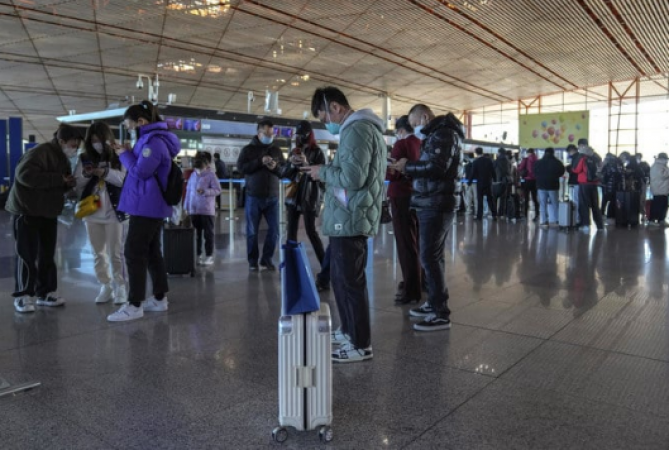
Beijing: Concerns about the potential for new variants in China's ongoing explosive outbreak and the possibility that the government may not alert the rest of the world quickly enough have led the US, Japan and other countries to introduce COVID-19 tests for travelers arriving from China. Covid-19 testing has been made mandatory.
As of now, there is no report of a new variant. Worryingly, given the country's track record, China may not be disclosing information about any signs of tension developing, which could trigger new outbreaks elsewhere.
In announcing a negative test requirement for travelers from China on Wednesday, the US cited a surge in infections and claimed a lack of knowledge, including genome sequencing, of virus strains in the country.
Also Read: UN: 30,000 people escape South Sudan's communal strife
According to Wang Pei-sheng, director of Taiwan's epidemic command center, his government is concerned about the unprecedented situation in China.
Authorities will begin screening everyone arriving from China on January 1, ahead of the anticipated return of some 30,000 Taiwanese for the Lunar New Year holiday at the end of the month. The status of the epidemic in China is currently opaque, he claimed. We don't really understand it, and the information isn't very reliable.
When he announced the testing requirement for travelers from China earlier this week, Japanese Prime Minister Fumio Kishida expressed similar concerns about the lack of information.
Overall, the World Health Organization needs more data on the severity of the outbreak in China, particularly on hospital and ICU admissions, "to conduct a comprehensive risk assessment of the situation on the ground," according to Tedros Adhanom Ghebreyesus, WHO Director General of
Additionally announcing different testing requirements for travelers from China are India, South Korea, Taiwan and Italy. Keeping an eye on the situation, the German health authorities have not yet taken any such preventive measures.
Also Read: After the internet shutdowns were eased, online businesses grew in Kashmir
According to Sébastien Guelde, a spokesman for the health ministry, "We have found no indication that a more dangerous variant has developed in this outbreak in China that would be reason to declare a virus variant zone, which would bring the associated travel restrictions."
Chinese Foreign Ministry spokeswoman Mao Ning said last week that China has always responsibly shared its information with the WHO.
To cooperate with the international community in a spirit of solidarity to better protect people's life and health, address the COVID-19 challenge, restore stable economic growth, and build a global community of health for all, he said. Are ready.
Earlier this month, China relaxed many of its stringent pandemic rules, allowing the virus to spread rapidly in a country with relatively few infections after an initial, devastating outbreak in the city of Wuhan in early 2020.
The ruling Communist Party's sudden abandonment of its hardline policies is the primary cause of angry concerns around the world, according to Miles Yu, director of the China Center at the Hudson Institute, a conservative think tank in Washington, DC.
"You can't maintain the absurdity of a "zero-covid" lockdown for such a long period of time and then suddenly have a vast number of infected leave the world from China," Yu said in an email. The risk of significant outbreaks elsewhere .
Due to a pandemic of infections, China is currently facing a shortage of cold medicines, long waiting times at fever clinics, and overcrowded emergency rooms that are turning away patients. As a result of the exponential increase in cremations, Guangzhou, a city in southern China, has asked families to delay funeral services until next month.
Chinese state media denied that it had covered the story extensively and accused Western media of exaggerating the situation.
Also Read: Man denied parole after being found guilty of making a hoax bomb threat against British Muslims
Wang Wenbin, another foreign ministry spokesman, said on Wednesday that "this kind of rhetoric is motivated by prejudice, aimed at defaming China, and motivated by politics." Since the start of the pandemic, the government has been accused of censoring information about the outbreak.
A 2020 AP investigation revealed that China was limiting the dissemination of its own internal research on the causes of COVID-19. In a report released this year, a WHO expert group said "key pieces of data" about the origins of the pandemic were still lacking and urged further research.